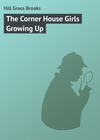Buch lesen: «The Corner House Girls Snowbound», Seite 7
CHAPTER XIII – THE TIMBER CRUISER
Mr. Howbridge got up from his chair and advanced to meet the backwoodsman with hospitable hand. The roughly dressed, bewhiskered forester did not impress the young folks at first as being different from the men who had driven the sledges to the camp or those who had brought the party up Long Lake in the ice-boats.
Ike M’Graw had an enormous moustache (“like that of a walrus,” Cecile whispered), but his iron-gray beard was cropped close. His face was long and solemn of expression, but his gray eyes, surrounded by innumerable wrinkles, had a humorous cast, and were as bright as the eyes of a much younger person.
He seized Mr. Howbridge’s hand and pumped it warmly. His grip was strong, and Mr. Howbridge winced, but he continued to smile upon the old man.
“Mr. Birdsall told me that if I wanted to know anything up here, or wanted anything done, to look to you, Mr. M’Graw,” said the lawyer, as their hands fell apart.
“I bet he didn’t say it jest that way, Mr. Howbridge,” chuckled the man. “No. I reckon he jest called me ‘Ike.’ Now, didn’t he? And ‘Old Ike,’ at that!”
Mr. Howbridge laughed. “Well, he did speak of you in that way, yes,” he admitted.
“I reckoned so,” M’Graw said. “Yep, I’m ‘Old Ike’ to my friends, and what my enemies call me don’t matter at all – not at all.”
“I fancy you don’t make many enemies up here in the woods, M’Graw,” said Mr. Howbridge, waving the visitor to a comfortable seat before the fire.
“Nor friends, nuther,” chuckled the man. “No, sir, there ain’t sech a slather of folks up here to mix in with, by any count.”
Before the woodsman took his seat the lawyer introduced him to Mrs. MacCall and to Ruth, individually, and to the rest of the group in general.
“Hi gorry!” exclaimed Ike M’Graw, “you’ve got a right big fam’ly, haven’t you? You won’t be lonesome up here – no, you won’t be lonesome.”
“And that is what I should think you would be,” Mr. Howbridge said. “Lonesome. If you get snowed in you don’t see anybody for weeks, I suppose?”
“Better say ‘months,’ Mister,” declared M’Graw. “I’ve been snowed into my cabin back yonder in the valley from the day before Christmas till come St. Patrick’s Day. That’s right.”
“I understood you lived near the Lodge, here, Ike?” said the lawyer.
“Oh, I do in winter, since Mr. Birdsall asked me to,” the man said. “But sometimes – ’specially when there was visitors up here – the population of this here ridge got too thick for Old Ike. Then I’d hike out for my old cabin in the valley.”
Quickly Mr. Howbridge put in a query that had formed in his mind early in the evening:
“Have you been troubled with visitors up here this winter?”
“No, sir! It’s been right quiet here, you might say.”
“Nobody here at all until my party came yesterday?”
“Well, not many. Some timbermen went through for Neven. His company’s got a camp over beyond the Birdsall line. Yes, sir.”
“Strangers have not been here, then?”
“Why, no. Not to my knowledge,” said M’Graw, with a keener look at the lawyer. “You wasn’t meanin’ nothin’ special, was you? I’ve been away over to Ebettsville for a week. Nothin’ stirring here before I went.”
The conversation had become general again among the main party. Mr. Howbridge drew his chair nearer to the old man’s ear.
“Listen,” he said. “When my men came up yesterday and opened the house with the key I had given them, they found somebody had been in here not many hours before they arrived.”
“How’d they know?”
“The fire had scarcely died out in one of the grates upstairs.”
“Hum! Fire, eh? And I hadn’t been inside this Lodge since b’fore Thanksgiving. Kinder funny, heh?”
“Yes.”
“Anything stole?”
“Not a thing touched as far as we know. No other traces but the embers in that grate – ”
“Hold on, Mister!” exclaimed M’Graw, but in a low voice. “What grate are you referrin’ to? Which room was this fire in?”
Mr. Howbridge told him. The old man’s face was curious to look upon. His brows drew down into a frown. His sharp eyes lost their humorous cast. Of a sudden he was very serious indeed.
“That thar room,” he said slowly, and at length, “was Miz’ Birdsall’s.”
“So I believed from the way it was furnished and from what Frank had told me of the house.”
“Yes, Mister. That was her room. She thought a heap of sittin’ in that room; ’specially in stormy weather. And the little shavers used to play there with her, too.”
“Yes?”
“Them little shavers thought a sight of their mom,” pursued M’Graw.
“I gathered as much from what Frank told me,” Mr. Howbridge said seriously.
“By the way, Mr. Howbridge,” said M’Graw in a different tone, “where are the little shavers?”
“You mean the twins, of course? Ralph and Rowena?”
“Yes, sir.”
The guardian of the Birdsall twins rather hesitatingly told the old man just why he had not brought Ralph and Rowena to Red Deer Lodge at this time.
“Ran away? Now listen to that!” murmured the old man. “That don’t sound right. Wasn’t they with folks able to take keer of ’em?”
“I thought they were,” said Mr. Howbridge. “Rodgers, the butler, and his wife.”
“Whoof!” exclaimed the backwoodsman, expelling his breath in a great snort of disgust. “That butler! Wal, what for a man wants to buttle for, I don’t know. I never could make it out that it was a real man’s job, anyway. And that Rodgers was one useless critter. I don’t blame them little shavers for runnin’ away from Rodgers an’ that sour-apple wife of his. I know ’em both.”
“If that is the case,” said the lawyer sadly, “I wish I had known them as well as you appear to. Then I should have made other provision for the twins right at the start.”
“But shucks!” said M’Graw, suddenly grinning. “Them two little shavers will turn up all right. Ralph and Roweny are right smart kids.”
“That may be. But we don’t know where they have gone to. Of course, Ike, they couldn’t have got up here to Red Deer Lodge, could they?”
“I don’t know ’bout that,” said the old man. “I reckon they could have got here if they’d wanted to. But I know well ’nough they didn’t – not before I went away to Ebettsville a week ago.”
“Of course not! Somebody would have seen them at Coxford. And then, if they had come here, where are they now?”
“That’s right, Mister,” agreed Ike M’Graw. “But – but who started that fire in the grate?”
“If it had been the children wouldn’t they have been found here?”
“Mebbe. Tell you the truth” – and the old man’s weather-beaten face reddened a little. “Well, to tell you the truth, when you spoke of the fire in the grate, I was some took aback. Miz’ Birdsall bein’ killed here. And she likin’ that room so. And she finally dyin’ in it – well, I don’t know – ”
“Ike! you are superstitious, I do believe,” said the lawyer.
“Mebbe. But that never killed nobody,” said the man. “And funny things do happen. Howsomever – Say!” he exclaimed suddenly, “how’d these folks that made the fire get into the house and out again?”
“Hedden, my man, says he found nothing broken or burst open. It must have been by the use of a key. And the only key I knew of up here was yours, Ike.”
“That’s right,” said the backwoodsman, nodding. “Mine’s the only key up here.”
“But the intruders couldn’t have used that.”
“Yes, they could, too! I didn’t take it with me when I went away from here.”
“Who would know where it was?”
“Anybody might have seen it that looked into my shack,” admitted the old man. “I ain’t in the habit of hidin’ things. We don’t have burglars up here, Mister. That key, and others, hung right on a nail beside my chimley-place. Yes, sir!”
“Then any person passing by could have found the key and entered the Lodge?” asked Mr. Howbridge.
“Only we don’t have many folks passin’ by,” returned Ike thoughtfully.
“I can’t understand it.”
“It is a puzzle,” admitted M’Graw. “Hi gorry! I ain’t been to my shack yet since comin’ back from Ebettsville. Mebbe the key ain’t thar no more.”
“To what door was it?” asked the lawyer.
“This here,” replied M’Graw, jerking a thumb toward the main entrance. “Padlock on the outside of the door. All the other doors was barred on the inside. Oh, she was locked up hard and fast!”
“I don’t understand it,” said the lawyer. “You look when you go home and see if the key is hanging where you left it.”
“Hi gorry! I will,” promised the backwoodsman. “I’d better bring the key over here tomorrow, anyway. And I reckon you want them figgers on the timber Neven wants to cut?”
“Yes. Of course, Ike, you have made no mistake in cruising the timberland?”
“I never make mistakes, Mister,” said the old man. “That wouldn’t do in the woods. The man that’s brought up, as I was, with wildcats an’ bears an’ sech, can’t afford to make mistakes. This was a lots wilder country when I was a boy from what ’tis now.”
“I find that Neven’s figures are very different from yours.”
“Likely. And I reckon they’re in his favor, ain’t they?” and M’Graw chuckled. “Ye-as? I thought so. Well, you take it from me, Mister: I’m working for Birdsall’s youngsters, not for Neven.”
“I believe that to be a fact,” the lawyer agreed warmly. “I have already told Neven that there are other companies that will make a contract with us if he doesn’t care to accept your report.”
“I b’lieve I know this Birdsall strip a leetle better’n any other feller in these parts. I’ve lived on it twenty year, and knowed it well before that time. I’ve seen some o’ this timber grow. Reckon I ain’t fooled myself none.”
After that Mr. Howbridge drew the old into the general conversation. Ike approved vastly of the young people, it was evident. Agnes and the smaller children were popping corn. There were apples roasting on the hearth. The cider was handed about in glasses which one of the servants brought.
“We shall look to you for help in amusing these young people, Ike,” Mr. Howbridge said. “Is it going to snow enough tonight to keep them indoors tomorrow?”
“No, no,” the old woodsman assured them. “It’s snowing some, but not much yet awhile. This here storm that’s comin’ has got to gather fust. We’ll get a heavy fall, I don’t doubt, in the end; but not yet. Like enough, ’twill be purty fair tomorrow.”
Reassured by this prophecy, the little folks soon after went to bed. Nor were the older members of the party long behind them. They had had a long and wearying day, and the beds beckoned them.
CHAPTER XIV – BY THE LIGHT OF THE MOON
Ike M’Graw, the timber cruiser, was an excellent weather prophet; and this was proved to be a fact before all of those at Red Deer Lodge had gone to bed on this first night.
Neale O’Neil chanced to raise the shade of one of the windows in the boys’ room before undressing, and exclaimed to Luke:
“Hey! who said it snowed? Look at that moon up there!”
Luke Shepard joined him and looked out, too, at the rather misty orb of night that peered through the breaking clouds. But little snow had fallen during the evening.
“Going to be a good day, just as that old codger said it would,” agreed Luke. “My, how white everything is – really, silver! And a lonely place, isn’t it?”
“You said it,” agreed Neale. He was feeling in his pockets, and suddenly added: “Crackey! I’ve lost my knife.”
“You had it down there peeling apples for the girls,” said Luke, who was beginning to undress.
Sammy was already in bed and sound asleep. Neale started for the door.
“I don’t want to lose that knife,” he said. “I am going to run down and get it.”
The serving people had gone to bed, but there were dim lights on the gallery and one below in the big hall. Neale ran lightly down the carpeted stairs on his side of the house. The light was so dim that he fumbled around a good while hunting for the missing knife.
Suddenly something clattered about his ears – some missiles that came from above, but were not much heavier than snowflakes, it would seem. Neale jumped, and then stared around.
He could not see a thing moving or hear anything. Where the white objects had come from he could not understand. Finally he found one that had rolled on the floor.
“Popcorn! Say! it’s not snowing popcorn in here – not by any natural means,” the boy told himself, immediately suspicious.
Suddenly he spied his knife, and he pocketed that. As he did so there came another baptism of popcorn. He dropped down below the edge of a table which stood in the middle of the room under the chandelier. All the light came from above, and there was not much of that; so it was dark under the table.
He heard a faint giggle. “Ah-ha!” thought Neale. “I smell a mouse! That is a girl’s giggle.”
He saw that the way to the foot of the stairs that were nearest the girls’ rooms, was quite dark. He ran out from under the table, but softly and on his hands and knees, and reached the stairway without making a sound.
The popcorn rattled again upon the table top, and once more he heard the giggle. He wormed his way up the stairs in the shadow and reached the gallery. Here a jet of gas from the side wall gave some light. He saw the robed figure hanging over the bannister and in the act of throwing another handful of popcorn at the spot where the boy was supposed to be crouching.
Neale O’Neil crept forward from the top of the stairs, still on his hands and knees. He was likewise in the shadow, although he could see the figure ahead of him plainly.
“Meow!” crooned the boy, imitating a cat with remarkable ingenuity. “Meow!”
“Oh, mercy!” hissed a startled voice.
“Ma-ro-o-ow!” urged Neale O’Neil, repeating his feline success.
“Mercy!” ejaculated the whisperer. “That’s a strange cat.”
“Ma-row-ro-o-ow!” continued Neale, with a lingering wail.
“Here, kitty! kitty! kitty!” murmured the girl crouching by the bannister. “Oh, where are you? Poor kitty!”
Immediately Neale changed his tone and produced a growl that not only sounded savage but seemed so near that the startled girl jumped up with a cry:
“Oh! Oh! Neale!”
“Ma-row-ro-o-ow! Ssst!” continued what purported to be a cat, and one that was very much annoyed.
“Oh! Oh! OH!” shrieked Agnes, springing up and leaning over the railing. “Neale! Come quick!”
And there Neale was right beside her! He appeared so suddenly that she would have shrieked again, and perhaps brought half the household to the spot, had not the boy grabbed her quickly and placed a hand over her mouth, stifling the cry about to burst forth.
“Hush!” he commanded. “Want to get Mrs. Mac or Mr. Howbridge out here to see what is the matter?”
“Oh, Neale!” sputtered Agnes. “I thought you were a cat.”
“And I thought you were a hailstorm of popcorn.”
“You horrid boy! To scare me so!”
“You horrid girl! To shower me with popcorn!”
“I don’t care – ”
“Neither do I.”
Agnes began to giggle. “What were you doing down there?” she asked.
“I was looking for my pocketknife. Wouldn’t lose it for a farm Down East with a pig on it!” declared the boy. “What are you doing out here?”
“I went to Mrs. Mac’s room to give her her nightcap. It was in my bag. Oh, Neale! do you suppose it will be clear by morning, as that funny old man says?”
“It’s clear now.”
“You don’t mean it?”
“Come along here to the window and look for yourself,” the boy said, and led her toward the front of the house along the gallery.
There was a broad and deep-silled window over the front door of the Lodge. Neale drew back the hangings. They could see out into the night which was now all black and silver.
The forest that edged the clearing in which stood the Lodge was as black as ever an evergreen forest could be. The tops of the trees were silvered by the moonbeams, but the shadows at the foot of the trees were like ink.
In the open the new-fallen snow glittered as though the moonlight fell on precious stones. It was so beautiful a scene that for a moment Agnes could only grip Neale O’Neil’s arm and utter an ecstatic sigh.
“Scrumptious, isn’t it?” said the boy, understanding her mood.
“Lovely!” sighed Agnes. “Ruth and Cecile ought to see this.”
“Hold on!” warned the boy. “Get them out here and we’ll both be sent to bed in a hurry. Ruth’s got her bossing clothes on – has had ’em on ever since we left Milton.”
“Te-he!” giggled Agnes suddenly. “She feels her responsibility.”
“Guess she does,” chuckled Neale. “But there’s no need to add to her troubles. Believe me! the less I am bossed around by her the better I like it.”
“Oh, Neale,” said Agnes, “she only does it for your good.”
“Don’t you fret,” returned the boy, with a sniff. “I can get along without Ruth or anybody else worrying about whether I’m good, or not. Believe me!”
“Oh!” squealed Agnes suddenly. “What’s that?”
“Huh! Seen a rat? Scared to death?” scoffed Neale O’Neil.
“Look at that thing out there! It’s no rat,” declared the girl eagerly.
Neale then looked in the direction she pointed. Not twenty yards from the house, and sitting on its haunches in the snow, was an object that at first Neale thought was a dog. The shadow it cast upon the moon-lit snow showed pointed ears, however, and a bushy tail.
“Crackey, Aggie!” gasped Neale, “that’s a fox.”
“A fox? Right here near the house? Just like that?” gasped the girl. “Why – why, he must be wild!”
“Crackey!” returned Neale, smothering his laughter, “you didn’t suppose he was tame, did you?”
“But – but,” stammered the girl, “if a wild fox comes so near the house, one of those dreadful lynxes may come – or a bear. I never! Why, we might be besieged by wolves and bears and wildcats. Did you ever?”
“No, I never was,” scoffed Neale. “Not yet. But, really, I am willing to be. I’ll try anything – once.”
“I guess you wouldn’t be so smart, young man, if the animals really did come here and serenade us. Why – ”
“Listen! That fellow is serenading us now,” declared Neale, much amused.
The sharp, shrill yap of the fox reached their ears. Then, from the rear of the house where Tom Jonah was confined in the back kitchen, the roar of the old dog’s bark answered the fox’s yapping.
And then from somewhere – was it from above and inside the house, or outside and in the black woods? – there sounded a sharp explosion. Agnes flashed a questioning glance at Neale; but the boy pointed, crying:
“Quick! Look! The fox!”
The little animal with the bushy tail that had raised its pointed nose to yap mournfully at the moon, had suddenly sprung straight up into the air. It cleared the snow at least four feet. One convulsive wriggle it gave with its whole body, and fell back, a black heap, on the snow.
“Oh, Neale! what happened to it?” gasped Agnes, amazed.
“Shot,” said the youth, a curious note in his voice.
“Oh, who shot it?”
“Ask me an easier one.”
“Why – what – I think that was sort of cruel, after all,” sighed the girl. “He wasn’t really doing any harm.”
“I thought you were afraid he might eat us all up,” said Neale, dropping the curtain which he had been holding back, and turning away from the window.
“Oh – but – I am serious now,” she said. “Who do you suppose shot him?”
“I could not say.”
“That old woodsman, perhaps? There is none of our party out there with a gun, of course. Oh, dear! I hope I don’t dream of it. I don’t like to see things killed.”
But the thought of dreaming about seeing the fox shot did not trouble Neale O’Neil when he parted with Agnes and went back to his room. Nor was it anything about the death of the creature that absorbed his attention.
It was who the huntsman was and from where the shot was fired that puzzled Neale O ’Neil. Had the shot been made from outside or inside the house?
For it seemed to the boy that the explosion had been above their heads; and he chanced to know that none of the party from Milton – not even the servants – were quartered on the third floor of Red Deer Lodge.
Who, then, could be up there shooting out of one of the small windows at the yapping fox? He said nothing about this to Agnes; but he determined to make inquiry regarding it the first thing in the morning.
CHAPTER XV – A VARIETY OF HAPPENINGS
They were near the shortest day of the year and the sun rose very late indeed; so nobody at Red Deer Lodge got up early, unless it was the kitchen man who had to light the fires and bring in much wood. He tramped paths through the new-fallen snow to the outbuildings before sunrise. By the time Neale O’Neil, his head filled with the puzzling thoughts of the night before, reached the rear premises, the yard of the Lodge was marked and re-marked with footsteps.
He sought Hedden, however, having seen that the snow in front of the Lodge showed no footprint. The fox lay just where it had been shot.
“Does any of our party sleep in the garret, Hedden?” Neale asked the butler.
“No, young man. We all have rooms at the back of the house.”
The boy told the man about the shooting of the fox. “Of course, one of the men was not out with a small rifle, and plugged old Reynard when he was howling at the moon, was he?”
“No,” replied the butler. “Neither John nor Lawrence knows how to use a gun, I’m sure. Perhaps it was that tall man, Ike M’Graw.”
“Well, seems to me he ought to have come and got the pelt,” said Neale, ruminatingly. “It’s worth something all right, when furs are so high. Say, Hedden, how do you get upstairs into the garret?”
Hedden told him, presuming that it was merely a boy’s curiosity that caused him to ask. But Neale had a deeper reason than that for wishing to find the way upstairs.
He could not understand from what angle the fox had been shot while he and Agnes were looking out of the window, if the hunter had been in the wood. There had been no flash or sign of smoke from the edge of the forest, and Neale’s vision swept the line of black shadow for hundreds of yards at the moment of the report.
“Smokeless powder is all right,” muttered the boy. “But they can’t overcome the flash of the exploding shell in the dark. No, sir! That marksman was not in the wood. And the report sounded right over our heads!”
He said nothing more to Hedden, but found the upper stairs at the rear of the house. At the top was a heavy door, but it was not locked. He thrust it open rather gingerly, and looked into the great, raftered loft.
The sun was above the treetops now and shone redly into the front windows. There was light enough for him to see that as far as human occupants went, the garret of the Lodge was empty.
There was not much up here, anyway. Several boxes, some lumber, and a heap of rubbish in one corner.
Neale O’Neil stepped into the place and walked to the front of the building. The windows were square and swung inward on hinges. He knew that this row of front windows was directly over that at which he and Agnes stood looking out upon the moon-lit lawn at bedtime.
The windows were all fastened with buttons. As far as he could see none gave evidence – at least on the inside – of having been recently opened. Neale shivered in the chill, dead air of the loft.
If the marksman that had shot the fox was up here, from which window did he shoot? Neale could not find any mark along the window sill or on the floor.
Suddenly the boy began opening the windows, one after the other. Some of them stuck, but he persisted until each one swung open. Outside the snow that had fallen the evening before lay in a fluffy layer on the window sill.
At the third window he halted. In this layer of light snow was a mark. Neale uttered a satisfied exclamation.
It was the matrix of a round tube – the barrel of the gun that had fired the shot which had finished Reynard, the fox!
“Can’t be anything else,” thought the boy. “He knelt right here and rested his gun across the sill. Yes! it points downward – pressed heavier at the outer end than near the window. Yes!”
The boy got down and squinted along the mark in the snow. His keen eye easily brought the huddled, sandy object on the snow down below into range.
“Now, what do you know about that?” Neale O’Neil asked aloud. “Who was up here with a gun last night and popped over that fox? I wonder if I ought to tell Mr. Howbridge.”
Had he done so the lawyer would quickly have pieced together what Hedden had told him about the live embers in the grate and Neale’s discovery. Whether he would have arrived at a correct conclusion in the matter, was another thing.
However that might be, Neale O’Neil was sure that somebody had access to the garret and had shot the fox therefrom. After the rear premises of the Lodge had been tracked up so before daylight, half a dozen people might have left the house by the rear door without their footprints being seen. If the marksman had no business in the Lodge he could easily have got away.
Puzzling over these thoughts, Neale descended to find most of the party before the fire in the living-room, waiting for breakfast. Agnes was eagerly telling of the fox she had seen shot at bedtime.
Neale added no details to her story, save that the fox still lay on the snow outside.
“Whoever hit him didn’t care for the pelt,” said the boy. “Now that it is frozen, it will be hard to skin. A fox hide is worth something. I’m going to thaw out the body and try to save the skin – for Aggie, of course.”
“Oh, my!” cried the beauty, “won’t it be fine to have a collar or a muff made out of a fox that I saw shot with my own eyes?”
“Odd about that,” said Mr. Howbridge thoughtfully. “I wonder who could have been so near the Lodge last evening. And then, to have left the fox there!”
The breakfast call interrupted him. Neale said nothing further about it. After the meal, however, the young people all got into their warm wraps and overshoes and went out of doors.
Tom Jonah was turned loose, and he almost at once dashed around the house to the spot where the body of the fox lay. The children gathered around the fuzzy animal in great excitement.
“Oh, it looks like Mrs. Allen’s spitz dog – only this is reddish and Sambo, the spitz, is white,” Tess said. “The poor – little – thing!”
“This is no ‘expectorates’ dog,” chuckled Neale, grabbing the creature by the tail. “‘Expectorates’ is a much better word than ‘spits,’ Tess. Now, I am going to take this fellow and hang him up in the back kitchen where he will thaw out. No, Tom Jonah! you are not going to worry him.”
“What lovely long fur!” murmured Agnes. “Do you suppose you can really cure the skin for me, Neale?” she demanded.
“What’s the matter with the skin?” demanded Sammy, in wonder. “Is it sick?”
“Good gracious!” exclaimed Agnes. “These children have to be explained to every minute. I hope that fox skin has no disease, Sammy.”
Luke and Ruth and Cecile had gone for a tramp through the wood. The little folks set to work building a snow man which was to be of wondrous proportions when completed. Naturally Neale and Agnes kept together.
Agnes had been wandering along the edge of the wood in front of the house while Neale carried the fox indoors. Tom Jonah came back with Neale and began snuffing about the spot where the fox had laid.
“See here, Neale O’Neil,” cried Agnes, “I can’t find anybody’s footprints over here. Where do you suppose that man shot the fox from?”
“Humph!” grunted Neale noncommittally.
“But here’s just the cunningest hoofprints! See them!” cried Agnes.
The boy joined her. Two rows of marks made by split-hoofed animals ran along the edge of the wood.
“Crackey!” ejaculated the boy. “Those are deer.”
“You don’t mean it?”
“Must be. Red deer, I bet. And right close to the Lodge! How tame these creatures are.”
“Well, deer won’t hurt us,” said Agnes, decidedly. “Let’s see where they went to.”
Neale was nothing loath. One direction was as good as another. He wanted much to talk to somebody about the discovery he had made in the loft of the Lodge; but he did not wish to frighten Agnes, so he did not broach the subject.
The two rows of hoof marks went on, side by side, along the edge of the clearing. They followed them to the very end of the opening which had been cleared about Red Deer Lodge – the northern end.
Here began a narrow path into the woods. The spoor of the two animals led into this path, and the boy and girl tramped along after them.
“I guess nothing frightened them,” said Neale, “for they appear to be trotting right along at an easy gait. They must have passed this way in the night. And that’s kind of funny, too.”
“What is funny?” asked Agnes.
“Why, deer – especially two, alone – ought to have been hiding in some clump of brush during the night. They don’t go wandering around much unless they are hungry. And there is plenty of brush fodder for them to eat along the edge of the swamps, that is sure.”
“Are you sure they are deer?” asked Agnes. “They couldn’t be anything else, could they?”
“I reckon not,” laughed Neale. “I say! who lives here?”
They caught a glimpse of an opening in the forest ahead. Then a cabin appeared, from the chimney of which a curl of blue smoke rose into the air. There were several smaller buildings in the clearing, too.
“Guess we have struck that old timber cruiser’s place,” Neale said, answering his own question.
“Oh! Mr. Ike M’Graw!” cried Agnes. “Now we can ask him if he shot the fox last night.”
“But where did these deer go?” exclaimed Neale, stopping on the edge of the little clearing and staring all around.
For here the tracks they had followed seemed to cross and criss-cross all about the clearing. That wild deer should frolic so about an occupied house was indeed puzzling. He saw, too, that there were human footprints over-running the marks of the split hoofs.
Suddenly from around the corner of the cabin appeared the long, slablike figure of the woodsman. He saw them almost immediately.
“Hullo, there!” he cried. “Ain’t you out early? I wouldn’t have been up near so early myself, if it hadn’t been for those confounded shoats of mine.”
“What happened to the pigs?” asked Neale, smiling.
“They broke out o’ their pen. Always doin’ that!” returned M’Graw. “Run off through the woods somewhere, and then come back and made sech a racket around my shanty that I can’t sleep. Confound ’em!”
Neale suddenly saw a great light. He seized Agnes’ hand and squeezed it in warning. With his other hand he pointed to the marks in the snow.
“Are those the pigs’ footprints?”
“Yes. I just got ’em shut up again,” said the woodsman. “Come in, won’t you? I guess my coffee’s biled sufficient, and I’m about to fry me a mess of bacon and johnnycake.”


















